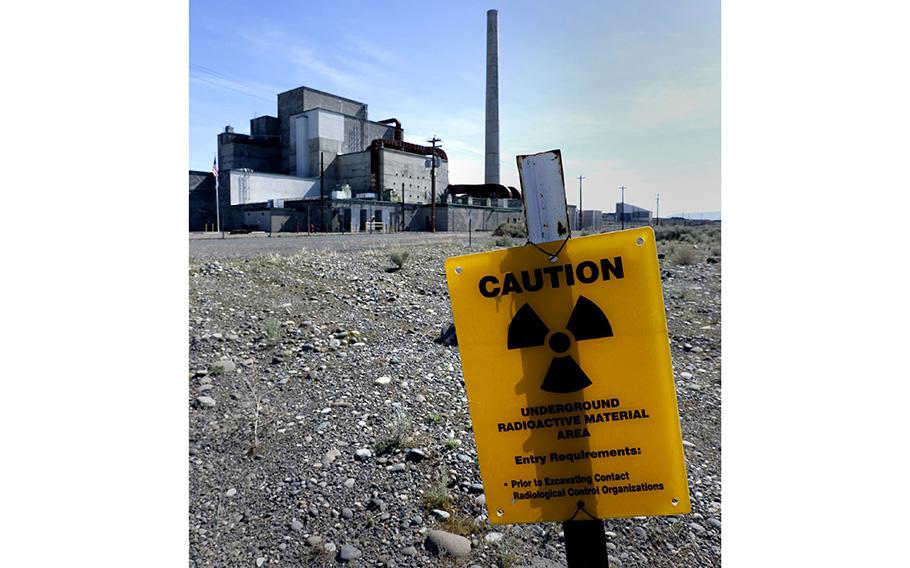
Signs remind visitors approaching the B Reactor on the Hanford Nuclear Reservation in south-central Washington in 2016. (Mark Boster, Los Angeles Times/TNS)
Congress is still working to pass the National Defense Authorization Act, a more than $800 billion piece of legislation that funds our nation’s military as well as programs for members of our military. But this year, for the first time, the NDAA could include justice for veterans who were harmed by U.S. nuclear tests and other victims of the Cold War nuclear arms race.
As the national commander of the National Association of Atomic Veterans, I hear from veterans across the country every day whose lives were changed forever by exposure to radiation and other toxins. The Radiation Exposure Compensation Act gives atomic veterans sickened by U.S. nuclear tests the opportunity to apply for compensation that can help pay for medical treatment, other expenses, or simply offer recognition of the harms they suffered.
For many atomic veterans, RECA is the best and only option for help with exposure-related illnesses — it’s been reported that the Department of Veterans Affairs rejected 86% of radiation-related claims by veterans, making RECA all the more important for atomic veterans. RECA offers fewer benefits than the VA, but is much simpler to navigate, and has been a godsend to many veterans.
As a cleanup veteran, I am not eligible for RECA, but I have seen firsthand how much it has helped my fellow atomic veterans. However, RECA is set to expire next summer, and those veterans of the Cold War will be left without recourse or assistance. The news of high denial rates of atomic veterans seeking care from the VA is the latest example of veterans being left to fend for themselves. Veterans are dying while waiting for care. This is why we need to extend RECA and expand it to include cleanup veterans – too often, veterans cannot afford to battle out their claims for years with the VA. They need care now.
Veterans like Alex Partezana, from Cleveland, who was 22 years old when he served at Upshot Knothole where the U.S. government tested 11 nuclear weapons in the desert of Nevada. Alex was stationed in the trenches near the test, without any protective equipment or a film badge to measure his exposure. After the nuclear test he was told to walk toward ground zero, collecting Geiger counter measurements, while senators and higher-ups watched from over a mile away.
Or Mike Cobb, from Friant, Calif., who was stationed in the Pacific Proving Grounds as part of Operation Dominic, where he witnessed 21 nuclear tests. Mike was one of the few men in his unit with protective gear — and even that was just goggles. Sixty years later, Mike was diagnosed with bladder cancer, an illness associated with radiation exposure. Mike was able to receive compensation through RECA, offering him recognition for the risk he had unknowingly been asked to bear and the pain and suffering he endured as a result.
As for me, I worked to decontaminate Enewetak Atoll in the Pacific, where the U.S. military conducted 43 nuclear tests between 1948 and 1958. The U.S. military spent $239 million in a failed attempt to make the island habitable again, digging up and moving over 110,000 cubic yards of radiation contaminated soil and debris – enough to fill over 7,500 dump trucks. We worked with no personal protective equipment, resorting to t-shirts over our mouths to avoid inhaling radioactive dust. After my service, I experienced an ever-growing list of health problems all associated with exposure to radiation: my wife and I struggled to conceive; I was plagued by random fevers and bone pain; teeth crumbled in my mouth; I developed numbness in my hands and feet and radiation-related cataracts; at 40 I learned had the bones of a 90-year-old man and would need a hip replacement. Eventually, I was diagnosed with a thyroid disorder, a common result of exposure to radiation. Within the last five years, after living with pain for two decades, I finally had both hips replaced, along with my left knee.
Taking care of veterans is part of the cost of war. Congress should stand by the veterans who, often unknowingly, sacrificed their health and the peace of their families to keep our country safe. The project to develop, test and clean up nuclear weapons cost trillions of dollars and thousands of hours of work. The least we can do is provide health care and benefits to those harmed by that endeavor. Now we can finish the job, and ensure veterans of that effort have access to the health care and assistance they need.
Congress should ensure the NDAA includes language extending RECA to allow additional time for those harmed by nuclear weapons tests to apply for benefits. Time is not on any of our sides, and our atomic veterans deserve all the time they can get.
Keith Kiefer is national commander of the National Association of Atomic Veterans.